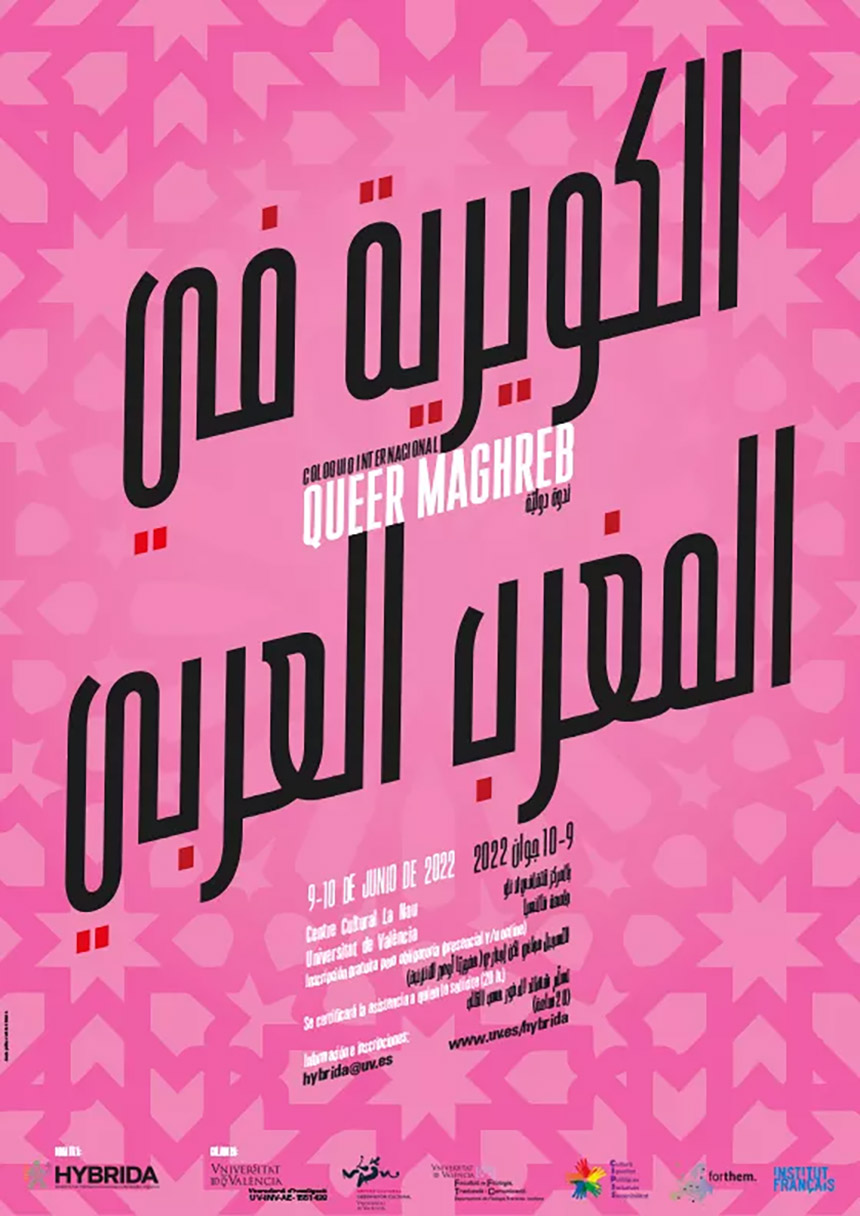
The La Nau Cultural Centre will hold the international colloquium ‘QUEER MAGHREB’ on the 9 and 10 June.
The society and artistic-literary production of the western countries of North Africa, which are known as Maghreb, and in particular those countries that have had some kind of “colonial” relationship with France (Algeria, Morocco and Tunisia), are no strangers to the changes that characterise the “democratic” advances of a globalised world. These shifts are marked by the values of the societies that Europe perceives as “Western”, which demonstrates the influence and exchanges between both contexts, nuanced by the postcolonial heritage. At the same time, they warn us about the risks that the imposition of certain decontextualised models pose.
In recent decades, in terms of artistic creation in a broad sense, a group of artists from Maghreb, whether living in their country of origin or abroad, have shown a special predisposition to explore new identity possibilities that go beyond gender binary and the traditional distribution of sexual roles. This way, art and literature allow for the intrusion – not without risk – of elements that not so long ago seemed inconceivable in such sociocultural context.
Even if it is just emerging, it is evident that this is a new way of approaching plural and dissident sexualities and shaping the relation of the individual with themselves, as well as with the world. These “intrusions” are made increasingly visible both socially (through the struggle of associations and alternative spaces) as well as through Maghrebi cinema, literature and art. There, we observe the emergence of cultural productions, accounts and stories that are framed within this political and critical perspective that we can refer to as “queer”, in order to place it in a global dynamic without losing the local dimension perspective. We have paid special attention to the Tunisian context.
In this international colloquium we have opted for an hybrid approach that combines meetings with Maghrebi creators and speeches by guest university specialists. Within the first group, we will start with the cinematographic production by prestigious filmmakers such as Nasreddine Shili and Medhi Ben Attia. Afterwards, we will discuss the work of playwright and director Moncef Zahrouni. Artists Mala Badi and Mohamed Issaoui will share their political commitment and their experience as “queer” artists, as well as a performance in the Sapiencia Chapel. As for literary production, we will count with journalist and writer Hicham Tahir and former football player Ouissem Belgacem. We will as well dedicate a space for activism through a meeting with Rania Arfaoui, who represents the Mawjoudin (‘We exist’) association. We will close the colloquium with a panel of discussion with testimonies by LGBTIQ+ migrants with political asylum in Spain, and another one online with outstanding dancers and writers such as Rochdi Belgasmi, Achraf El Abed and Jaffar Lamrini. As for guest conferences, they will cover the work of writers such as Jean Sénac, Abdellah Taïa and Fatima Daas. A mapping of the LGBTQ+ cyberactivism in the Maghrebi context will be performed, and there will be a discussion on the topic of gay visibility and erotisation of the Maghrebi in media and film. We will as well count with the participation of an outstanding figure, Imam and writer Ludovic-Mohamed Zahed, who will reflect on trans identities and contemporary Islamic readings. The closure ceremony will be performed by trans artist Alex Medina, La Sudanesa.
This colloquium is organised by the HYBRIDA Research Group (Cultural Hybridisations and Migrant Identities) of the Universitat de València, and it is part of the activities of the Cultural Observatory of the La Nau Cultural Centre. This colloquium has the support of the Office of the Vice-Principal for Research, the Department of French and Italian, the Vice-Dean of Culture, Equality, Inclusive Policies and Sustainability of the Faculty of Language Studies, Translation and Communication, the Diversity and Migration Lab of the Forthem Alliance and the Institut Français of Valencia.
The registration (in person and online) is free of charge, but must be done via email: hybrida@uv.es
Attendance will be certified upon request (20 hours).
The colloquium can be attended online.
Directors:
- Domingo Pujante González / GIUV2013-144 HYBRIDA: Cultural hybridisations and migrant identities / Department of French and Italian / Universitat de València / Spain
- Mouna Ben Ahmed / Université de Sousse / Tunisia
Artistic director:
- José Luis Iniesta / GIUV2013-144 HYBRIDA: Cultural Hybridisation and migrant identities / Universitat de València / Spain
Secretary:
- Henry F. Vásquez Sáenz / University of Cádiz / Spain
- Scientific committee:
- Juan Vicente Aliaga / Universitat Politècnica de València / Spain
- Jean-Pierre Boulé / Notingham Trent University / United Kingdom
- Carmen Carmona / Universitat de València / Spain
- Ralph Heyndels / University of Miami / United States
- Alexandre Madonia / Palermo University / Italy
- Catherine Mavrikakis / Université de Montréal / Canada
- Birgit Mertz-Baumgartner / University of Innsbruck / Austria
- Ana Monleón / Universitat de València / Spain
- Denis M. Provencher / University of Arizona / United States
- Marta Segarra / Laboratoire d’Études de Genre et de Sexualité (LEGS) – CNRS / France
- Edwige Tamalet Talbayev / Tulane University / United States
- Jean Zaganiaris / Université Hassan II de Casablanca / Morocco
- Khalid Zekri / Université Moulay Ismaïl – Meknes / Morocco
Information and registration at: hybrida@uv.es / www.uv.es/hybrida








